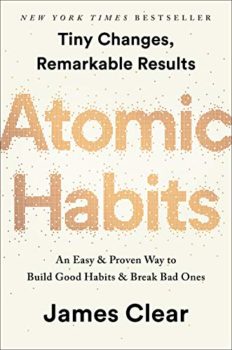A MONTH OR SO AGO, I discovered a book that has forever changed how I think about goals and the way I attain them. Two years ago, I wrote a 15-part series titled “Your Best Writing Year Yet!” in which I detailed the methods and tips I have found useful for setting and accomplishing goals. The series focused on writing-related goals, of course, but the principles I laid out in those articles work regardless of the type of goal you set.
Then, along came *Atomic Habits: An Easy & Proven Way to Build Good Habits & Break Bad Ones by James Clear.
 Clear contends that goals, by themselves, are not enough. What we need in order to improve and transform our lives is a better system of habits.
Clear contends that goals, by themselves, are not enough. What we need in order to improve and transform our lives is a better system of habits.
Nothing that Clear writes is entirely new to me, but the way he presents it — with logical, story and fact-based evidence for why habits are the basis of a better life — opened my eyes to a new way of thinking about how I organize my own life.
I’ve always been goal-oriented. You probably already know this about me. But I never understood why some goals were easier to achieve than others. I can see now that it was, in almost every case, because I had built a system of habits that supported and helped me make progress.
Without desirable habits we won’t reach our goals. Period.
Deep down, I already knew this. You do too. It’s common sense. That’s one of the reasons we break our goals down into tiny, doable tasks. Because we intuitively understand that if we make a habit of doing something each day toward a specific goal, we are more likely to achieve it.
[bctt tweet=”“Goals are good for setting a direction, but systems are best for making progress.” James Clear” username=”writingthrulife”]
But how many of us consciously arrange our lives so that the habits are the goals and the journey itself becomes the focus of our energy? Obviously, that’s a rhetorical question, but I’d venture to say that the answer is “not many.”
But here’s the thing — though we often know which habits we want to establish, desirable habits such as flossing every day can be difficult and take a long time to establish while undesirable habits can seem almost impossible to break.
In Atomic Habits, Clear compares habit change to three onion-like layers: outcomes, processes, and identity. Outcomes are basically our goals — those things we want to achieve, like fitting into a smaller size of jeans or finishing the first draft of our novel. Process is about changing our routines and habits. And Identity, the innermost level of the habit onion, is about changing our basic sense of who we are, our self-image, and worldview.
Clear sums it up:
Outcomes are about what you get. Processes are about what you do. Identity is about what you believe.
Why is it important to understand these habit layers? Because when we focus on our identity, we focus on who we want to become, rather than what we do. We address our core belief systems and make change at a fundamental level.
Why is it important to address our core belief systems?
Because we will fail at anything we’re trying to do that does not match our self-image. If you do not see yourself as a writer, you will fail to write as much as you think you should, because writing is not consistent with how you see yourself. You will experience trying to establish a habit of writing as difficult and…well…trying. On the other hand, if you identify as a writer, writing becomes irresistible and takes priority in your life. And you have likely already established the habit of writing on a regular basis.
The more deeply you identify with a particular image of yourself, the more you will be motivated to behave how a person like that should behave and to maintain the habits that reinforce your self-image.
Does this mean that if you don’t believe you’re a writer deep down that you’re destined for failure? Not at all. It means that your goal needs to shift from “I want to write every day” to “I want to become a writer,” or from “I want to write a book” to “I want to become an author.” Then, the question of what to do also changes from “What are the steps I need to take to write every day?” to “What do I need to do to become a writer?” These can be subtle but important shifts in perspective.
This self-image:habit pairing works with our negative core beliefs as well as our positive ones. If you are constantly saying “I’m a procrastinator” (I hear this one a lot from my students and clients) or “I’m disorganized,” then you will also resist habits that don’t align with these negative images you have of yourself.
And the more deeply you believe something about yourself, the harder it is to change. (We know this, right?)
 So there’s a kind of chicken-or-egg relationship between core beliefs and our habits. We maintain habits that support our core beliefs and we resist habits that don’t — and, at the same time, who we think we are is based on our habits. Or, as Clear states, “Your identity emerges out of your habits,” and “…your habits are how you embody your identity.”
So there’s a kind of chicken-or-egg relationship between core beliefs and our habits. We maintain habits that support our core beliefs and we resist habits that don’t — and, at the same time, who we think we are is based on our habits. Or, as Clear states, “Your identity emerges out of your habits,” and “…your habits are how you embody your identity.”
Therefore, the more you perform a particular activity or behavior, the more you identify with that behavior. When you maintain a desirable habit long enough, you see yourself differently, and the habit becomes a part of who you are — and no longer something you need to work to maintain. The habit simply becomes a part of your life.
If you’re interested in becoming a writer — or a better writer — stay tuned.
Over the next three weeks, I’ll be taking a deeper dive into Atomic Habits and discuss how you can use Clear’s four laws of habit forming to become the writer you’ve always wanted to be.
[sg_popup id=”11907″ event=”inherit”][/sg_popup]







I once read that it takes 21 days to establish a new habit–whatever that habit may be….writing, losing weight, learning a new skill, etc. However, must of us give up before the 21 days. I’ve found that 21 days to be true of me. If I commit to a new habit, I’m committed to practicing it for 21 days. Just sharing 🙂
I agree that it takes time to establish a habit, though current research actually indicates that it may longer than 21 days in many cases. It really depends on the type of habit, how fast a person adapts, etc.
Timely post! Thanks, Amber
I need to check out this book by James Clear. I am totally in agreement that establishing habits will ultimately bring the goal to fruition. I’ve loved reading and writing since I could remember. Now that I’ve been retired, writing a book seemed to be a goal, but my habits were not established to get the words down on paper. I procrastinated and dreamed about the book, but never conquered my lack of discipline of sitting down and writing. Joining a writers’ group made the difference for me and gave me the incentive to sit down and write on a certain day or days to produce the chapters necessary to build my book. It’s finished now, and in the process of editing. I don’t know if publishing is possible, but that’s the next step. All in all, there were some habits I had to establish in order to bring this goal to life. Thanks for the info and I’ll be reading “Atomic Habits” to use for other goals.
Thank you for joining the conversation, Kathy. Joining a writer’s group is a great way to create accountability and provide incentive to maintaining a habit, that’s for sure! Congrats on finishing your book and getting it to the editing stage!
Pingback: Become a Better Writer by Revolutionizing Your Habits, Part 2 – Writing Through Life
Pingback: Becoming a Better Writer by Revolutionizing Your Habits, Part 3 – Writing Through Life